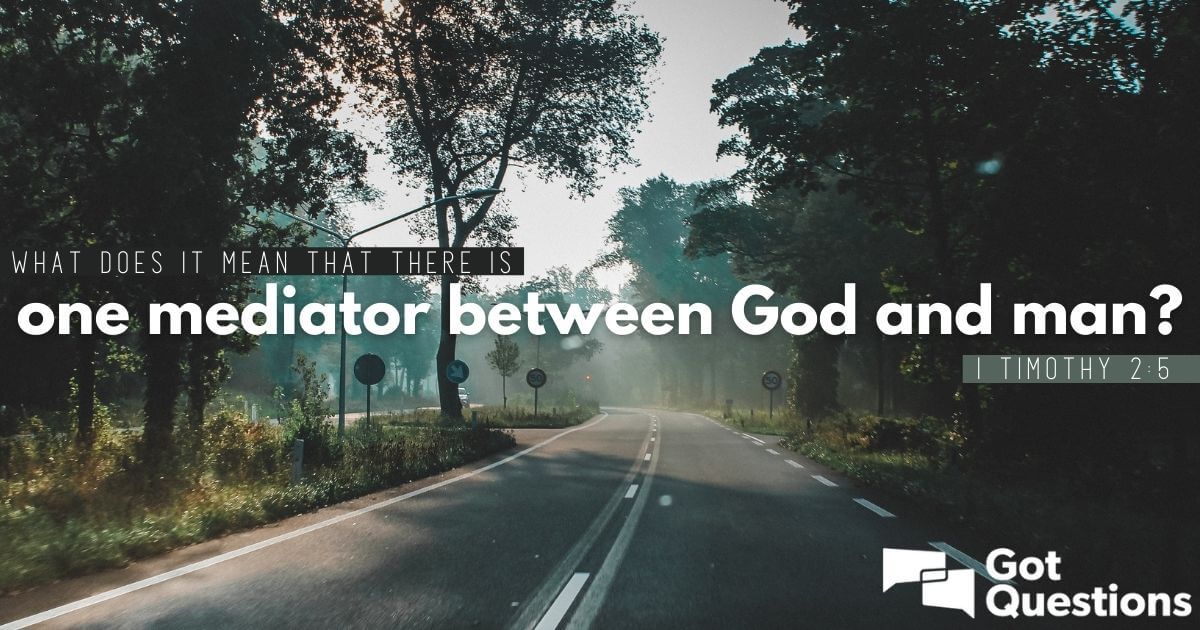Just to clarify... Mary doesn't have divine intervention. Her exceptional righteousness and closeness to Christ commend her intercession on our behalf.
"The prayer of the righteous is powerful and effective." - James 5:16
The scriptures say LOUDLY that you are preaching false ideas.
1 Timothy 2:5
5 For there is one God, and one mediator also between God and men, the man Christ Jesus,
What does it mean that there is one mediator between God and man? What is the meaning of 1 Timothy 2:5?
www.gotquestions.org
From Got Questions:
A mediator is an official “go-between” who acts as a link between two parties to reconcile their differences. The term literally means “one who stands in between.” In legal disputes, a mediator represents the interests of both parties, working as an intercessory agent to negotiate a settlement. In global conflicts, a mediator intervenes between opposing world powers to try to achieve peace.
The apostle Paul writes In
1 Timothy 2:5, “For there is one God and one mediator between God and mankind, the man Christ Jesus.” Humanity is born into sin (
Psalm 51:5). Sin is a problem because it stands in the way, blocking the relationship between humans and God. All people enter this world separated or estranged from the Holy God (
Isaiah 59:2;
Romans 5:10,
12) and deserving of His wrath (
Ephesians 2:3).
Romans 6:23 explains that the penalty for sin is
death, not only physical death but spiritual, eternal death (
Revelation 20:11–15).
Because of our sinful condition, human beings need a mediator to negotiate peace with God—and that person is Jesus Christ: “Since we have been made right in God’s sight by faith, we have peace with God because of what Jesus Christ our Lord has done for us” (
Romans 5:1, NLT).
Scripture reveals Moses as mediator of the Old Testament covenant (
Galatians 3:19; cf.
Exodus 20:19,
21–22;
Deuteronomy 5:5,
22,
23,
27,
31;
Acts 7:38). Moses entered God’s presence on behalf of the people of Israel. He drew near to God, speaking and interceding as their representative. Moses was God’s chosen mediator to lead the Israelites in the way of salvation through a relationship with God.
In the New Testament, Jesus Christ became the mediator of a
new, superior covenant: “But now Jesus, our High Priest, has been given a ministry that is far superior to the old priesthood, for he is the one who mediates for us a far better covenant with God, based on better promises” (
Hebrews 8:6, NLT).
Jesus, God’s
incarnate Son, is the perfect intermediary, better than Moses because He alone is appropriately qualified to be the one mediator between God and man. Only Jesus Christ is fully human and fully divine (
John 1:1,
14;
Hebrews 2:17). As man and God, Jesus is uniquely equipped to represent both sides. He alone stands in the gap between God and man. He alone meets the righteous requirements of the law, opening the way into God’s presence once and for all through His death on the cross and resurrection to life (
John 1:17;
Hebrews 3:1–6;
9:15,
22;
10:10;
12:24).
Only the sacrifice of the sinless, spotless Lamb of God could fully pay the ransom required to set people free from sin and eternal death. Jesus took our punishment on Himself, making it possible for us to experience forgiveness of sin and freedom from its destructive control.
There is one mediator between God and man means that Christ is the only way to God the Father. Jesus said, “I am the way and the truth and the life. No one comes to the Father except through me” (
John 14:6). If we want to experience peace with God and a restored relationship of joy in His presence, we must come “by the blood of Jesus, by a new and living way opened for us through the curtain, that is, his body” (
Hebrews 10:19–20).
Jesus Christ is the one mediator—the one and only Savior of the world (
John 1:29;
1 Timothy 1:15). There is no other go-between. We come to God through faith in His Son, who is the only means of salvation. Religion cannot save us. Good works won’t make us right with God. Nothing but faith in Jesus Christ is sufficient to bridge the gap between sinful humanity and a Holy God.
As the one mediator between God and man, Jesus Christ now rules in the hearts of believers and “is at the right hand of God . . . interceding for us” (
Romans 8:34, ESV). We can live in the secure knowledge that, in the end, Christ will put every enemy “under his feet,” including “the last enemy,” which is death itself (
1 Corinthians 15:24–27).
I don't see a word about Mary, hence this is a False doctrine

